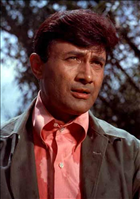


'‘Romancing with life’- the title of Dev Anand’s autobiography, aptly summed up the way in which the superstar lived his life. He lived it on his own terms and lived it to the fullest. With his demise, Indian cinema has lost its one of the most loved and admired icons.
As an advocate’s son and an Honors graduate in English literature, Dev could well have chosen to lead a pen-pusher’s cushy, comfortable life. But instead he chose to chase a dream. He left his Lahore-based ancestral home and came to Mumbai to make it big in films. Of course, there were hurdles aplenty in this path. For three years, he struggled to make ends meet and did sundry jobs like working in British Military’s Censor Office, where all he did was to read and edit soldiers’ letters to their families! Finally he got his break in Prabhat films’ Hum Ek Hain in 1946.
It was only in the post-Independence India that he came to be truly recognized and how! He went on to become Hindi film industry’s one of the most shining stars in the 50s and 60s, when he, along with Dilip Kumar and Raj Kapoor, formed the ruling superstar troika.
On screen, Dev was this lovable rogue, who could melt any heart with his suave, urbane charm, but who also showed a penchant for walking on the wrong side of morality and legality. So in Kala Bazar, he was the black marketer; in Pocketmaar, he was a pickpocket; in Sharaabi, he was an alcoholic beyond redemption; in Bambai Ka Babu, he was a murderer, who impersonated his victim and in Tere Mere Sapne, he was a doctor losing his idealism to commercialism! Even his most celebrated role- Raju Guide in Guide portrayed a flawed man, who fell in love with a married lady and then, swindled her!
The music in Dev’s films and the songs picturized on him represent the very best from the classic era. I would even go one step further and say that he got the best ever songs composed for any hero in Hindi films. Whosoever sang for him and whosoever composed for him always came up with something special. Melody, rhythm, verve, variety…his songs had everything.
He had four musical aces up his sleeve and they never let hit him down. S.D. Burman was his ace of spades, the one who composed all those lovely numbers in films such as Baazi, Jaal, House No. 44, Taxi Driver, Nau Do Gyarah, Bambai Ka Babu, Teen Deviyan, Paying Guest, Kala Pani, Kala Bazar, Guide, Gambler, Jewel Thief, Tere Mere Sapne and Prem Pujari.
Mohammed Rafi was his ace of diamonds, the one whose voice immortalized so many honeyed romantic and sentimental classics such as ‘Tere mere sapne ab ek rang hai’, ‘Jiya ho jiya kuchh bol do’, ‘Apni to har aah ik toofan hai’ and ‘Aise to na dekho’.
R.D. Burman was his ace of clubs, the one whose trendsetting music in the seventies’ films like Hare Rama Hare Krishna, Heera Panna, Joshila, Warrant and Bullet helped further Dev’s innings as the leading hero, when his contemporary competitors had already beaten retreat to character roles.
Kishore Kumar was his ace of hearts, the one whose voice truly represented Dev’s macho, maverick free-bird spirit through numerous popular numbers such as ‘Khwaab ho tum yaa koi haqeeqat’, ‘Maana janaabne pukara nahi’, ‘Nazraana bheja kisine pyar ka and ‘Aise na mujhe tum dekho’.
His movies and their music have ensured that the world won’t ever forget this debonair star with Gregory Peck- looks and quirky mannerisms. The man never rested on his laurels and always kept looking ahead. His young-at-heart outlook and never-say-die spirit only rested while he was asleep and it was fitting that he left this world in his sleep, perhaps dreaming about yet another new project!
Just a few months prior to his demise, he had released the colorized version of his 1961-classic Hum Dono. One song from that perfectly sums up the feelings of his countless admirers.
“Abhee na jaao chhodkar ki dil abhee bharaa nahee…!”
(“Don’t leave just now, the heart is still desiring for more!”)